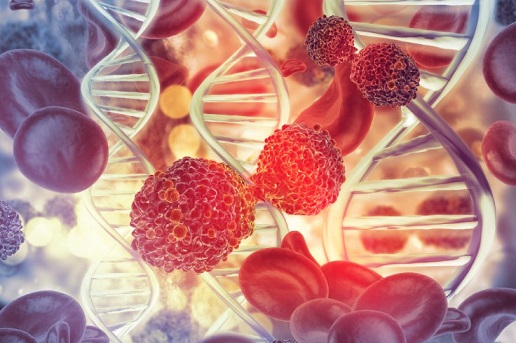Researchers Discover a Genetic Anomaly EWSR1 ATF1 Translocation Could be Behind the Onset of Various Cancers!
Nikhil Prasad Fact checked by:Thailand Medical News Team Dec 23, 2024 3 months, 3 weeks, 5 days, 1 hour, 22 minutes ago
Medical News: In a groundbreaking development in cancer research, scientists have uncovered new insights into a genetic anomaly that significantly contributes to the onset of several rare but aggressive cancers. The genetic anomaly, known as the EWSR1::ATF1 translocation, has been identified as a key driver in several malignancies. This research was conducted by a collaboration of scientists from the University of Central Lancashire, the Centre of Excellence for Pancreatic Diseases at Semmelweis University, and Translocon Biotechnologies PLC. This
Medical News report will delve into the details of the study, highlighting its importance in advancing our understanding of these cancers and exploring the potential for new diagnostic and therapeutic approaches.
 Researchers Discover a Genetic Anomaly EWSR1 ATF1 Translocation Could be Behind the
Researchers Discover a Genetic Anomaly EWSR1 ATF1 Translocation Could be Behind the
Onset of Various Cancers!
What is the EWSR1::ATF1 Translocation?
The EWSR1::ATF1 translocation is a chromosomal rearrangement involving the EWSR1 gene on chromosome 22 and the ATF1 gene on chromosome 12. This rearrangement creates a chimeric fusion gene that produces a protein with unique and often harmful properties. Normally, EWSR1 and ATF1 function independently, with EWSR1 playing a role in transcription regulation and ATF1 involved in cellular growth and differentiation. However, when these genes fuse, the resulting protein disrupts normal cellular functions, leading to uncontrolled cell growth and cancer development.
Key Findings of the Study
The researchers studied various cancers, including clear cell sarcoma, malignant mesothelioma, and intracranial myxoid mesenchymal tumors, all of which are associated with the EWSR1::ATF1 fusion. Their analysis revealed several critical findings:
Genetic Mechanism
The study highlighted how the EWSR1::ATF1 fusion protein alters the cell’s genetic programming. Normally, ATF1 binds to specific DNA sequences to regulate gene expression. However, when fused with EWSR1, the protein’s binding pattern changes, leading to the activation of genes that drive cancer growth. This alteration was particularly evident in genes involved in cell cycle regulation, proliferation, and metastasis.
Tissue-Specific Effects
Interestingly, the fusion protein’s effects vary depending on the type of tissue. For example, in clear cell sarcoma, the fusion protein activates genes associated with melanocyte differentiation, giving the tumor a misleading appearance similar to melanoma. In contrast, in intracranial tumors, the fusion protein activates genes involved in neural development and angiogenesis.
Diagnostic Implications
One of the most significant implications of the study is its potential to improve cancer diagnosis. Many of the cancers associated with the EWSR1::ATF1 translocation are rare and challenging to diagnose due to their similarity to other conditions. By identifying the presence of this fusion
gene, pathologists can more accurately diagnose these cancers and differentiate them from similar diseases.
Therapeutic Potential
The researchers also explored the therapeutic implications of their findings. They identified several pathways activated by the fusion protein that could be targeted with existing drugs. For example, inhibitors of histone deacetylase (HDAC) showed promise in suppressing the activity of the EWSR1::ATF1 fusion protein, particularly in clear cell sarcoma. While these findings are preliminary, they offer hope for new treatment options for these aggressive cancers.
Broader Impact of the Research
This study is not just about understanding a single genetic anomaly. It sheds light on the broader concept of fusion genes in cancer. Fusion genes like EWSR1::ATF1 represent a growing area of interest in oncology because they often serve as the primary drivers of tumor development. By studying these genes, scientists can uncover new mechanisms of cancer progression and identify novel targets for therapy.
Additionally, the research emphasizes the importance of precision medicine. By focusing on the specific genetic changes driving each patient’s cancer, doctors can develop more effective and personalized treatment strategies. This approach is particularly critical for rare cancers, where traditional treatment options are often limited.
Conclusion
The study provides a deeper understanding of the EWSR1::ATF1 translocation and its role in cancer. Their findings highlight the genetic mechanisms driving these cancers, the diagnostic potential of detecting fusion genes, and the promise of targeted therapies.
The implications of this research extend beyond the specific cancers studied. They underscore the importance of genetic analysis in understanding and treating cancer, paving the way for more effective and personalized approaches to oncology.
The study findings were published in the peer-reviewed International Journal of Molecular Sciences.
https://www.mdpi.com/1422-0067/25/24/13693
For the latest Cancer News, keep on logging to Thailand
Medical News.
Read Also:
https://www.thailandmedical.news/news/sars-cov-2-causes-cathepsin-l-upregulation-which-in-turn-raises-risk-of-cancer-and-tumor-progression
https://www.thailandmedical.news/news/scientists-in-china-find-that-fasting-helps-in-combating-cancer
https://www.thailandmedical.news/news/alcohol-and-cancer-risk-new-insights-on-a-complex-link
https://www.thailandmedical.news/articles/cancer
